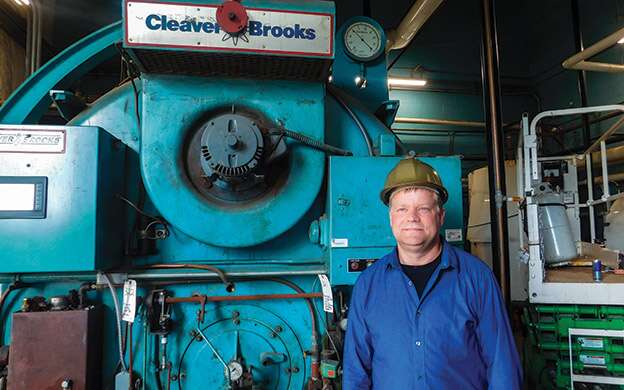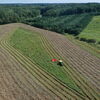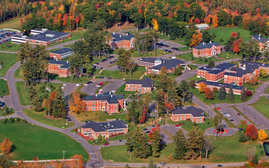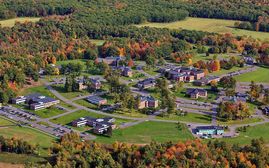
Libra Foundation makes a strategic $6M investment in former Grant's Dairy
 Photo / Tim Greenway
Jere Michelson, president, COO and CFO of the Libra Foundation in Portland, says the Bangor operation will consolidate its cheese operations and start a new and potentially large business, milk blends.
Photo / Tim Greenway
Jere Michelson, president, COO and CFO of the Libra Foundation in Portland, says the Bangor operation will consolidate its cheese operations and start a new and potentially large business, milk blends.
Mark Whitney says he knew he had his work cut out for him when he walked into the former Grant's Dairy building in Bangor's Hildreth North Business Park last December. The doors were open, the heat and electric were off, and the smell of mold permeated the building, thanks to four years of water leakage from the roof and burst pipes.
“Our first priority is to get the cut, wrap and cheese-aging operations moved here from Mars Hill,” says Whitney, the former creamery manager at Pineland Farms Creamery, which will consolidate operations in New Gloucester and Mars Hills into a site in Bangor.
First Pineland Farms must rehab the 75,000-square-foot building, a process started in May. It will outfit the site with cheese vats and other cheese-making equipment from New Gloucester and add a system to create milk blends, all by the end of 2018.
Whitney now is president of a new entity created on April 28 called Pineland Farms Dairy Co. Inc., a for-profit company formed and funded by parent company Libra Foundation, a nonprofit based in Portland.
The spin-out was necessitated when New Albany, Ohio-based Bob Evans Farms Inc. (NASDAQ: BOBE) acquired Pineland Farms Potato Co., which shares space with the cheese operation in Mars Hill. Bob Evans didn't want the cheese operation owned by Pineland Farms Potato. Libra kept the cheese operation, and then spun it out into the new dairy company three days before it closed the potato company sale to Bob Evans on May 1.
The dairy company has a transition agreement until May 1, 2018, to remove the cheese operation from the Mars Hill plant. During that time, Bob Evans will continue to sell and ship the cheese, Whitney says.
Resurrecting an aging facility
Part of the cheese consolidation involves Pineland Farms Dairy resurrecting a business that had once been a hallmark of the Bangor facility, which was first a milk bottler called Grant's Dairy. Garelick Dairy bought Grant's in 1994, and Garelick in turn was bought in 1997 by Suiza Foods, which acquired and took on the name Dean Foods Co. (NYSE: DF), which is based in Dallas. Dean made a milk blend at the plant before shuttering it in January 2013.
Milk blend, which includes milk, butter and flavors tailored to specific clients, is widely used in frozen foods like the mashed potatoes made by Bob Evans, as well as by brands like Sara Lee, Cheesecake Factory, Dunkin' Donuts, says Jere Michelson, president, COO and CFO of Libra.
“The Bangor facility's primary function is not going to be cheese,” Michelson says. “It is for milk blend operations. Because the plant is big enough, it affords us the opportunity to consolidate the cheese business up there. But it's really the milk-blend business that's driving that project.”

For now, the cheese company has about $4 million in annual revenue and is breaking even. However, Pineland's largest business, beef, is expected to hit $65 million in revenue this year, and the potato business revenue topped $50 million when Bob Evans bought it.
“We want the blend business to replicate the potato and beef revenues,” says Michelson. “This is a new business for us.”
Customers could include Bob Evans, which buys its milk blend for the Mars Hill mashed potato operation from out-of-state suppliers. The wet, heavy blend is costly to transport, so buying from the Bangor plant should save Bob Evans money, Michelson says.
Each tote of wet milk blend holds about 300 gallons, weighing 2,500 pounds each, so a tractor trailer can hold 30,500 pounds of blend. Bob Evans now gets three trailer loads of milk blend per week from New York and elsewhere, Whitney says.
“Bob Evans out of Mars Hill [will] spend $6 million a year on milk blend,” predicts Michelson. “Milk blend companies already are stretched, so there's plenty of room for us.” The aim is for the Bangor plant to produce milk blend by the late summer or early fall of 2018.
Credence Research Inc., which uses a broad definition for dairy ingredients in its research, predicted that market, valued at $46.7 billion in 2015, would grow to $70.2 billion by 2023.
Pulling it all together
After Whitney adds the electric, milk lines, water, pipes and the refrigeration for half the plant to age cheese, the Mars Hill operation will move its machinery to Bangor. He expects the cut, wrap and aging operations to be up and running by the May 1, 2018, deadline. So far, no Mars Hill employees have indicated they want to move to Bangor, so Whitney expects Bob Evans to hire them.
Next, the New Gloucester operations will be moved up. Cheese is made there to the point where it is hardened into 40-pound blocks that still are being trucked to Mars Hill. After the move, they will be made in Bangor, where they also will be aged, cut, wrapped, sold and shipped. After the cheese operation is consolidated, Whitney can focus on getting all the milk blend machines in place. About five people from New Gloucester, plus Whitney, are moving to Bangor.
In all, the new Pineland dairy investment could be about $6 million, including $675,000 for the building and property, $1.6 million in building and property renovations and $1 million for cooler panels to age the cheese.
Libra bought the building from real estate investor Lawrence Springer of Brewer.
More hiring expected
Fifty more people are expected to be hired locally by Pineland Farms Dairy. About half will be in the cheese operation initially, and the rest in milk blends and administration.
Whitney said the dairy company just hired a sales person, and is ready to extend an offer to its first local employee, a man who worked at Grant's Dairy for 14 years and another five years at Garelick in various positions. Pineland Farms Dairy also has hired Al Lorenz, former plant manager for both Grant's and Garelick, as a consultant.
“Al knows the blends processing and I know the cheese,” says Whitney, who expects other former dairy workers to come forward and apply. He also expects the plant to at some point make other products like yogurt in the 20% of the factory space left for expansion.
The resurrected plant also is good news for local dairy farmers, who typically have to pay to haul their milk for processing. Now, the distance will be shorter, he says.
While the new company plans to make 700,000 pounds of cheese in New Gloucester this year, Whitney says he could easily make up to 1 million pounds a year in Bangor.
Libra's Michelson says he hasn't figured out the total economic impact of the resurrected factory to Bangor, but points to the jobs at the plant, the construction jobs, the restaurants and gas stations nearby that benefit from the activity and the opportunity for farmers to save transportation money and potentially expand their herds to meet demand at the new plant.
“Being able to drop milk off at our plant within a 50-mile radius is a huge benefit to farmers,” Michelson says, noting that the concentration of dairy farms and milk supply within that radius is one of the largest milk clusters in the state.














Comments